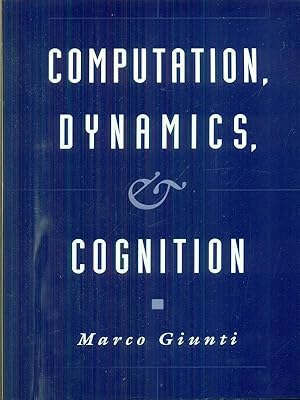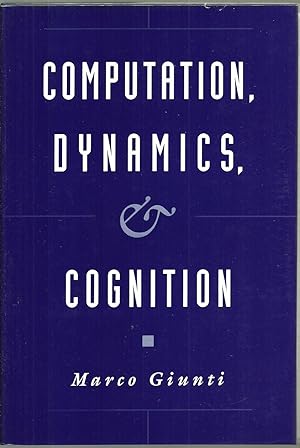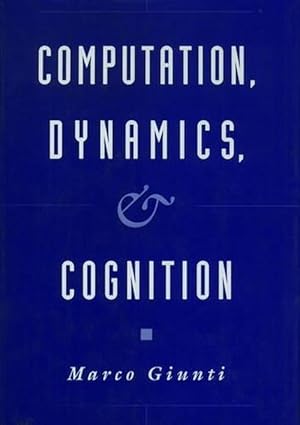computation dynamics cognition di giunti marco (28 risultati)
Filtri di ricerca
Tipo di articolo
- Tutti i tipi di prodotto
- Libri (28)
- Riviste e Giornali (Nessun altro risultato corrispondente a questo perfezionamento)
- Fumetti (Nessun altro risultato corrispondente a questo perfezionamento)
- Spartiti (Nessun altro risultato corrispondente a questo perfezionamento)
- Arte, Stampe e Poster (Nessun altro risultato corrispondente a questo perfezionamento)
- Fotografie (Nessun altro risultato corrispondente a questo perfezionamento)
- Mappe (Nessun altro risultato corrispondente a questo perfezionamento)
- Manoscritti e Collezionismo cartaceo (Nessun altro risultato corrispondente a questo perfezionamento)
Condizioni Maggiori informazioni
- Nuovo (18)
- Come nuovo, Ottimo o Quasi ottimo (4)
- Molto buono o Buono (6)
- Discreto o Mediocre (Nessun altro risultato corrispondente a questo perfezionamento)
- Come descritto (Nessun altro risultato corrispondente a questo perfezionamento)
Legatura
- Tutte
- Rilegato (27)
- Brossura (Nessun altro risultato corrispondente a questo perfezionamento)
Ulteriori caratteristiche
- Prima ed. (Nessun altro risultato corrispondente a questo perfezionamento)
- Copia autograf. (Nessun altro risultato corrispondente a questo perfezionamento)
- Sovracoperta (3)
- Con foto (11)
- Non Print on Demand (20)
Lingua (2)
Spedizione gratuita
Paese del venditore
Valutazione venditore
-
hardcover. Condizione: Good. Condizione sovraccoperta: Missing. Hardcover ex-library with typical marks shows moderate cover wear. No jacket. Text is unmarked. Ships FAST!
-
hardcover. Condizione: Very Good. Connecting readers with great books since 1972! Used books may not include companion materials, and may have some shelf wear or limited writing. We ship orders daily and Customer Service is our top priority!
-
hardcover. Condizione: Good. Connecting readers with great books since 1972! Used textbooks may not include companion materials such as access codes, etc. May have some wear or writing/highlighting. We ship orders daily and Customer Service is our top priority!
-
Hardback. Condizione: Fine. Condizione sovraccoperta: Very Good.
-
hardcover. Condizione: Very Good. Connecting readers with great books since 1972! Used books may not include companion materials, and may have some shelf wear or limited writing. We ship orders daily and Customer Service is our top priority!
-
Condizione: New.
-
Computation, dynamics & cognition
Editore: Oxford University Press, 1997
Da: Miliardi di Parole, Pietra Marazzi, AL, Italia
EUR 18,70
EUR 22,40 per la spedizione da Italia a U.S.A.Quantità: 1 disponibili
Aggiungi al carrelloCondizione: Buone. inglese Condizioni dell'esterno: sovracopertina leggermente logorata Condizioni dell'interno: Buone.
-
Condizione: As New. Unread book in perfect condition.
-
EUR 86,34
EUR 13,59 per la spedizione da Regno Unito a U.S.A.Quantità: Più di 20 disponibili
Aggiungi al carrelloCondizione: New. In.
-
EUR 86,33
EUR 17,02 per la spedizione da Regno Unito a U.S.A.Quantità: Più di 20 disponibili
Aggiungi al carrelloCondizione: New.
-
Computation, Dynamics, Cognition
Editore: Oxford University Press, New York, Oxford, 1997
ISBN 10: 0195090098 ISBN 13: 9780195090093
Lingua: Inglese
Da: Sabra Books, Naperville, IL, U.S.A.
Hardcover. Condizione: Very Good. Condizione sovraccoperta: Very Good. Minor wear along the DJ edges. Minor rubbing wear to DJ covers. Binding is not as tight.
-
EUR 97,29
EUR 17,02 per la spedizione da Regno Unito a U.S.A.Quantità: Più di 20 disponibili
Aggiungi al carrelloCondizione: As New. Unread book in perfect condition.
-
Computation, Dynamics, and Cognition
Editore: Oxford University Press Inc, US, 1997
ISBN 10: 0195090098 ISBN 13: 9780195090093
Lingua: Inglese
Da: Rarewaves.com USA, London, LONDO, Regno Unito
EUR 127,97
Gratis per la spedizione da Regno Unito a U.S.A.Quantità: Più di 20 disponibili
Aggiungi al carrelloHardback. Condizione: New. This book elaborates a comprehensive picture of the application of dynamical methods to the study of cognition. Giunti argues that both computational systems and connectionist networks are special types of dynamical systems. He shows how this dynamical approach can be applied to problems of cognition, information processing, consciousness, meaning, and the relation between body and mind.
-
Computation, Dynamics, and Cognition
Editore: Oxford University Press OUP, 1997
ISBN 10: 0195090098 ISBN 13: 9780195090093
Lingua: Inglese
Da: Books Puddle, New York, NY, U.S.A.
Condizione: New. pp. 192.
-
EUR 148,12
EUR 7,37 per la spedizione da Regno Unito a U.S.A.Quantità: 1 disponibili
Aggiungi al carrelloCondizione: New. pp. 192 9:B&W 6 x 9 in or 229 x 152 mm Case Laminate on Creme w/Gloss Lam.
-
EUR 147,61
EUR 9,95 per la spedizione da Germania a U.S.A.Quantità: 1 disponibili
Aggiungi al carrelloCondizione: New. pp. 192.
-
Computation, Dynamics, and Cognition
Editore: Oxford University Press Inc, US, 1997
ISBN 10: 0195090098 ISBN 13: 9780195090093
Lingua: Inglese
Da: Rarewaves.com UK, London, Regno Unito
EUR 116,01
EUR 73,74 per la spedizione da Regno Unito a U.S.A.Quantità: Più di 20 disponibili
Aggiungi al carrelloHardback. Condizione: New. This book elaborates a comprehensive picture of the application of dynamical methods to the study of cognition. Giunti argues that both computational systems and connectionist networks are special types of dynamical systems. He shows how this dynamical approach can be applied to problems of cognition, information processing, consciousness, meaning, and the relation between body and mind.
-
EUR 212,79
EUR 3,46 per la spedizione in U.S.A.Quantità: Più di 20 disponibili
Aggiungi al carrelloCondizione: New.
-
EUR 204,47
EUR 28,36 per la spedizione da Regno Unito a U.S.A.Quantità: 1 disponibili
Aggiungi al carrelloHardcover. Condizione: Like New. Like New. book.
-
Computation, Dynamics, and Cognition (Hardcover)
Editore: Oxford University Press Inc, New York, 1997
ISBN 10: 0195090098 ISBN 13: 9780195090093
Lingua: Inglese
Da: Grand Eagle Retail, Bensenville, IL, U.S.A.
Hardcover. Condizione: new. Hardcover. Currently there is growing interest in the application of dynamical methods to the study of cognition. Computation, Dynamics, and Cognition investigates this convergence from a theoretical and philosophical perspective, generating a provocative new view of the aims and methods of cognitive science. Advancing the dynamical approach as the methodological frame best equipped to guide inquiry in the field's two main research programs--the symbolic andconnectionist approaches--Marco Giunti engages a host of questions crucial not only to the science of cognition, but also to computation theory, dynamical systems theory, philosophy of mind, and philosophy ofscience. In chapter one Giunti employs a dynamical viewpoint to explore foundational issues in computation theory. Using the concept of Turing computability, he precisely and originally defines the nature of a computational system, sharpening our understanding of computation theory and its applications. In chapter two he generalizes his definition of a computational system, arguing that the concept of Turing computability itself is relative to the kind of support on whichTuring machine operate. Chapter three completes the book's conceptual foundation, discussing a form of scientific explanation for real dynamical systems that Giunti calls "Galileanexplanation." The book's fourth and final chapter develops the methodological thesis that all cognitive systems are dynamical systems. On Giunti's view, a dynamical approach is likely to benefit even those scientific explanations of cognition which are based on symbolic models. Giunti concludes by proposing a new modeling practice for cognitive science, one based on "Galilean models" of cognitive systems. Innovative, lucidly-written, andbroad-ranging in its analysis, Computation, Dynamics, and Cognition will interest philosophers of science and mind, as well as cognitive scientists, computer scientists, and theorists of dynamical systems.This book elaborates a comprehensive picture of the application of dynamical methods to the study of cognition. Giunti argues that both computational systems and connectionist networks are special types of dynamical systems. He shows how this dynamical approach can be applied to problems of cognition, information processing, consciousness, meaning, and the relation between body and mind. This book elaborates a picture of the application of dynamical methods to the study of cognition. Giunti argues that both computational systems and connectionist networks are special types of dynamical systems. Shipping may be from multiple locations in the US or from the UK, depending on stock availability.
-
Computation, Dynamics, and Cognition
Da: PBShop.store US, Wood Dale, IL, U.S.A.
HRD. Condizione: New. New Book. Shipped from UK. THIS BOOK IS PRINTED ON DEMAND. Established seller since 2000.
-
Computation, Dynamics, and Cognition
Da: PBShop.store UK, Fairford, GLOS, Regno Unito
EUR 89,45
EUR 5,69 per la spedizione da Regno Unito a U.S.A.Quantità: Più di 20 disponibili
Aggiungi al carrelloHRD. Condizione: New. New Book. Delivered from our UK warehouse in 4 to 14 business days. THIS BOOK IS PRINTED ON DEMAND. Established seller since 2000.
-
Computation, Dynamics, and Cognition (eng)
Da: Brook Bookstore On Demand, Napoli, NA, Italia
EUR 90,85
EUR 5,50 per la spedizione da Italia a U.S.A.Quantità: Più di 20 disponibili
Aggiungi al carrelloCondizione: new. Questo è un articolo print on demand.
-
Computation, Dynamics, and Cognition
Editore: Oxford University Press Inc, 1997
ISBN 10: 0195090098 ISBN 13: 9780195090093
Lingua: Inglese
Da: THE SAINT BOOKSTORE, Southport, Regno Unito
EUR 103,03
EUR 18,04 per la spedizione da Regno Unito a U.S.A.Quantità: Più di 20 disponibili
Aggiungi al carrelloHardback. Condizione: New. This item is printed on demand. New copy - Usually dispatched within 5-9 working days 515.
-
Computation, Dynamics, and Cognition (Hardcover)
Editore: Oxford University Press Inc, New York, 1997
ISBN 10: 0195090098 ISBN 13: 9780195090093
Lingua: Inglese
Da: CitiRetail, Stevenage, Regno Unito
EUR 96,38
EUR 41,97 per la spedizione da Regno Unito a U.S.A.Quantità: 1 disponibili
Aggiungi al carrelloHardcover. Condizione: new. Hardcover. Currently there is growing interest in the application of dynamical methods to the study of cognition. Computation, Dynamics, and Cognition investigates this convergence from a theoretical and philosophical perspective, generating a provocative new view of the aims and methods of cognitive science. Advancing the dynamical approach as the methodological frame best equipped to guide inquiry in the field's two main research programs--the symbolic andconnectionist approaches--Marco Giunti engages a host of questions crucial not only to the science of cognition, but also to computation theory, dynamical systems theory, philosophy of mind, and philosophy ofscience. In chapter one Giunti employs a dynamical viewpoint to explore foundational issues in computation theory. Using the concept of Turing computability, he precisely and originally defines the nature of a computational system, sharpening our understanding of computation theory and its applications. In chapter two he generalizes his definition of a computational system, arguing that the concept of Turing computability itself is relative to the kind of support on whichTuring machine operate. Chapter three completes the book's conceptual foundation, discussing a form of scientific explanation for real dynamical systems that Giunti calls "Galileanexplanation." The book's fourth and final chapter develops the methodological thesis that all cognitive systems are dynamical systems. On Giunti's view, a dynamical approach is likely to benefit even those scientific explanations of cognition which are based on symbolic models. Giunti concludes by proposing a new modeling practice for cognitive science, one based on "Galilean models" of cognitive systems. Innovative, lucidly-written, andbroad-ranging in its analysis, Computation, Dynamics, and Cognition will interest philosophers of science and mind, as well as cognitive scientists, computer scientists, and theorists of dynamical systems.This book elaborates a comprehensive picture of the application of dynamical methods to the study of cognition. Giunti argues that both computational systems and connectionist networks are special types of dynamical systems. He shows how this dynamical approach can be applied to problems of cognition, information processing, consciousness, meaning, and the relation between body and mind. This book elaborates a picture of the application of dynamical methods to the study of cognition. Giunti argues that both computational systems and connectionist networks are special types of dynamical systems. This item is printed on demand. Shipping may be from our UK warehouse or from our Australian or US warehouses, depending on stock availability.
-
Computation, Dynamics, and Cognition (Hardcover)
Editore: Oxford University Press Inc, New York, 1997
ISBN 10: 0195090098 ISBN 13: 9780195090093
Lingua: Inglese
Da: AussieBookSeller, Truganina, VIC, Australia
EUR 121,73
EUR 32,08 per la spedizione da Australia a U.S.A.Quantità: 1 disponibili
Aggiungi al carrelloHardcover. Condizione: new. Hardcover. Currently there is growing interest in the application of dynamical methods to the study of cognition. Computation, Dynamics, and Cognition investigates this convergence from a theoretical and philosophical perspective, generating a provocative new view of the aims and methods of cognitive science. Advancing the dynamical approach as the methodological frame best equipped to guide inquiry in the field's two main research programs--the symbolic andconnectionist approaches--Marco Giunti engages a host of questions crucial not only to the science of cognition, but also to computation theory, dynamical systems theory, philosophy of mind, and philosophy ofscience. In chapter one Giunti employs a dynamical viewpoint to explore foundational issues in computation theory. Using the concept of Turing computability, he precisely and originally defines the nature of a computational system, sharpening our understanding of computation theory and its applications. In chapter two he generalizes his definition of a computational system, arguing that the concept of Turing computability itself is relative to the kind of support on whichTuring machine operate. Chapter three completes the book's conceptual foundation, discussing a form of scientific explanation for real dynamical systems that Giunti calls "Galileanexplanation." The book's fourth and final chapter develops the methodological thesis that all cognitive systems are dynamical systems. On Giunti's view, a dynamical approach is likely to benefit even those scientific explanations of cognition which are based on symbolic models. Giunti concludes by proposing a new modeling practice for cognitive science, one based on "Galilean models" of cognitive systems. Innovative, lucidly-written, andbroad-ranging in its analysis, Computation, Dynamics, and Cognition will interest philosophers of science and mind, as well as cognitive scientists, computer scientists, and theorists of dynamical systems.This book elaborates a comprehensive picture of the application of dynamical methods to the study of cognition. Giunti argues that both computational systems and connectionist networks are special types of dynamical systems. He shows how this dynamical approach can be applied to problems of cognition, information processing, consciousness, meaning, and the relation between body and mind. This book elaborates a picture of the application of dynamical methods to the study of cognition. Giunti argues that both computational systems and connectionist networks are special types of dynamical systems. This item is printed on demand. Shipping may be from our Sydney, NSW warehouse or from our UK or US warehouse, depending on stock availability.
-
Computation, Dynamics, and Cognition
Da: AHA-BUCH GmbH, Einbeck, Germania
EUR 121,72
EUR 62,19 per la spedizione da Germania a U.S.A.Quantità: 2 disponibili
Aggiungi al carrelloBuch. Condizione: Neu. nach der Bestellung gedruckt Neuware - Printed after ordering - Currently there is growing interest in the application of dynamical methods to the study of cognition. Computation, Dynamics, and Cognition investigates this convergence from a theoretical and philosophical perspective, generating a provocative new view of the aims and methods of cognitivescience. Advancing the dynamical approach as the methodological frame best equipped to guide inquiry in the field's two main research programs--the symbolic and connectionist approaches--Marco Giunti engages a host of questions crucial not only to the science of cognition, but also to computationtheory, dynamical systems theory, philosophy of mind, and philosophy of science. In chapter one Giunti employs a dynamical viewpoint to explore foundational issues in computation theory. Using the concept of Turing computability, he precisely and originally defines the nature of a computational system, sharpening our understanding of computation theory and its applications. Inchapter two he generalizes his definition of a computational system, arguing that the concept of Turing computability itself is relative to the kind of support on which Turing machine operate. Chapter three completes the book's conceptual foundation, discussing a form of scientific explanation forreal dynamical systems that Giunti calls 'Galilean explanation.' The book's fourth and final chapter develops the methodological thesis that all cognitive systems are dynamical systems. On Giunti's view, a dynamical approach is likely to benefit even those scientific explanations of cognition which are based on symbolic models. Giunti concludes by proposinga new modeling practice for cognitive science, one based on'Galilean models' of cognitive systems. Innovative, lucidly-written, and broad-ranging in its analysis, Computation, Dynamics, and Cognition will interest philosophers of science and mind, as well as cognitive scientists, computer scientists, and theorists of dynamical sys.
-
Computation, Dynamics, and Cognition
Da: preigu, Osnabrück, Germania
EUR 225,25
EUR 70,00 per la spedizione da Germania a U.S.A.Quantità: 5 disponibili
Aggiungi al carrelloBuch. Condizione: Neu. Computation, Dynamics, and Cognition | Marco Giunti | Buch | Gebunden | Englisch | 2002 | Oxford University Press | EAN 9780195090093 | Verantwortliche Person für die EU: Libri GmbH, Europaallee 1, 36244 Bad Hersfeld, gpsr[at]libri[dot]de | Anbieter: preigu Print on Demand.













